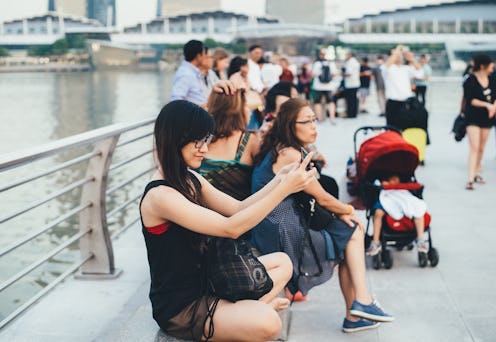Life
This Is The Worst App For Your Mental Health
If you've ever felt envy over that other girl that you obviously follow because she's just "so cool," science is finally here to confirm your feelings of envy or feeling like you will never be quite as fabulous, fit, or beautiful. The latest survey from the U.K.'s Royal Society For Public Health (RSPH) might have found what you already know — Instagram is the worst app for your mental health.
Their report, #StatusofMind, surveyed over 1,500 people aged 14-24 and shared that 91 percent of people ages 16-24 use social media. You might be going, duh, but rates of anxiety and depression have risen 70 percent in the past 25 years and — you guessed it — social media is attributed to the rates in increase. If you struggle with anxiety or depression, the study's findings might mean your love of Instagram or Twitter won't make it any better. The report stated, "Our own research has shown that young people themselves say four of the five most used social media platforms actually make their feelings of anxiety worse."
If you use social media for more than two hours a day, you are more likely to start seeing the signs of anxiety or "psychological distress." But don't worry, this is actually pretty normal. In Millennial speak, it's usually referred to as FOMO, or fear of missing out. This contributes to a "'compare and despair’ attitude," as RSPH called it, which explains feelings of inadequacy.
The RSHP survey mentioned that of all social media platforms, Instagram was rated "the most negative" and YouTube being the most positive.
The effects of social media use also translates into other areas of your life even when offline like sleeping or how you feel about your body after logging off. RSHP found that heavy social media use can impact your sleep cycle, so much that the one to two hours of sleep you need as a teenager may not come so easy among the bells and whistles on your phone. No matter what stage of life, adult or teen, RSHP stated that disruptions in sleeping patterns are also linked to mental health conditions such as obesity, heart attack and stroke.
When it comes to body image, the results also aren't so great. The report cited that 70 percent of 18-24 year olds have considered having cosmetic surgical procedure. Another study mentioned by RSHP cited social media as the root casue of why young girls felt like they wanted to alter their bodies.
So how do you do it? How do you rage against the machine that you so effortlessly incorporate into your everyday life, and can be pretty darn awesome?
First, log off. You don't have to tell anyone or share your reasoning. If you're feeling like your TL is just too much, quitting cold turkey isn't always the answer either. First, try silencing your notifications. Then, maybe the next step is deleting the social media apps that you use the least and pulling back on just how much you share on the ones you do like.
If you can maintain habits that limit your use, when you do log on, try surrounding yourself with the right energy. Just like a bad friend group, sometimes you have to take a step back to realize social media isn't always your "friend." Pushing "unfollow," muting or "unfriend" is not about being spiteful; it's about you getting healthy. One of the more positive attributes of using social media according to RSHP is that you can find supportive communities. And they're right! There are people out there like Elyse Fox, using platforms like Instagram to share that bit of #inspo that you needed to hear or simply say what you've been feeling.
Again, if you do log on, do it with a purpose. In a post for Real Simple, Julia Edelstein wrote that asking yourself, "Do I have a specific, positive reason for this?" could stop you from going down an unhealthy rabbit hole. I couldn't agree more! I would also add, that if you have to justify it using more than 140 characters, it probably isn't worth logging on.
It isn't easy and you've probably made this your NYE resolution a few years in a row. But also having a friend, family member, or even your roommate hold you accountable can help. Sometimes you just need someone to tell you to put your phone away at dinner, be present, or make you think twice about posting your burrito bowl.
The RSHP also has a few ideas about what social media platforms can do to be part of the solution. They've suggested platforms adopt features that highlight when a photo has been edited, introduce pop-up/notification warnings, and offer more training for professionals who work with youth that are at a higher risk.
While we wait for platforms to catch up, it starts with your decision. If you aren't feeling too hot about yourself or how your life is progressing, be honest with yourself. The help you need only comes when you acknowledge what you need. And judging by this report, you aren't alone.
